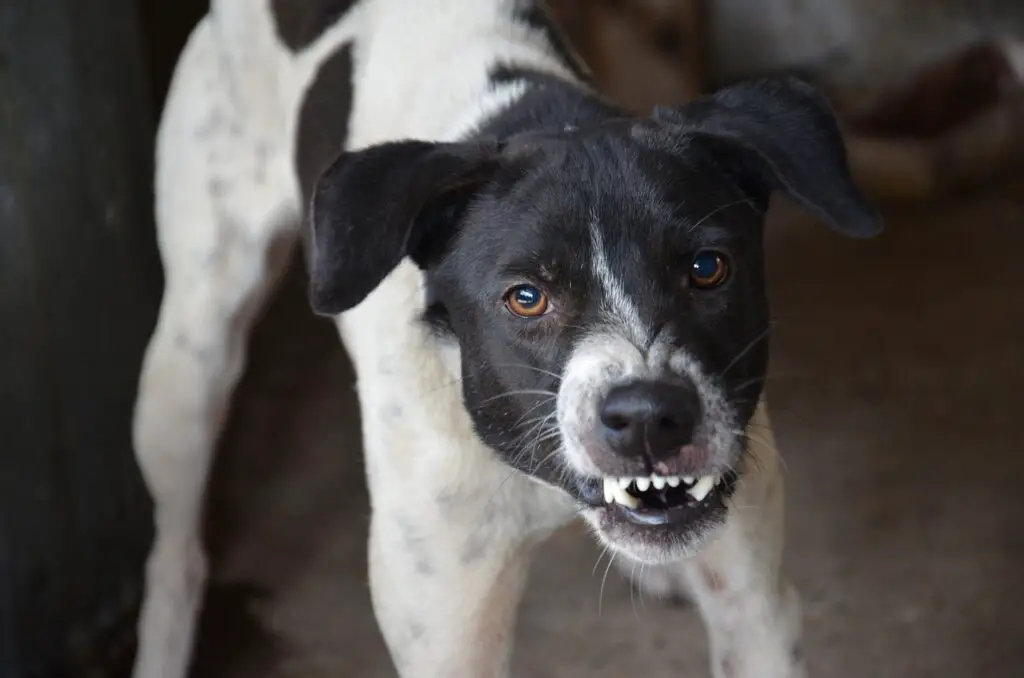Neutering is a widely recommended procedure for male dogs, offering numerous health and behavioral advantages.
While many pet owners seek neutering as a means to curb aggression related to hormones and territory, it’s important to recognize that the surgery may not be a one-size-fits-all solution for aggression in every dog.
In some instances, dogs may exhibit aggressive behavior post-neutering due to factors such as pain, stress, or underlying health issues.
This article will delve into the complexities of canine aggression after neutering, providing insights and guidance to help pet owners make well-informed decisions about this procedure while effectively addressing their dog’s behavior.
Key Takeaway
- In some cases, a dog can become aggressive after neutering due to changes in hormone levels and behavioral adjustments.
- Normal dog behavior after neutering can include reduced aggression, decreased roaming and urine marking, and potential temporary changes in appetite or energy level.
- Normal dog behavior after neutering can include reduced aggression, decreased roaming and urine marking, and potential temporary changes in appetite or energy level.
Can a Dog Become Aggressive After Neutering

Yes, in some cases, a dog can become aggressive after neutering.
Although neutering often helps reduce hormone-driven aggression, it is not a guaranteed solution for all types of aggression.
Various factors can contribute to post-neutering aggression:
- Pain or discomfort: After the surgery, your dog may experience pain or discomfort, which might cause irritability and increased aggression. Ensure appropriate pain management and follow your veterinarian’s post-operative care instructions to minimize discomfort.
- Stress: The surgical experience and recovery period can be stressful for your dog, potentially leading to increased aggression. Provide a calm and comfortable environment during the healing process to help reduce stress.
- Pre-existing aggression issues: If your dog already had aggression issues stemming from fear, anxiety, or other non-hormonal causes, neutering might not resolve them. In these cases, behavior modification techniques and professional help from a veterinary behaviorist or qualified dog trainer may be necessary.
- Underlying medical conditions: If your dog’s aggression persists or worsens after neutering, consult your veterinarian to rule out any underlying health issues that may be contributing to the behavior.
It’s crucial for pet owners to work closely with their veterinarians to determine the best course of action for addressing their dog’s specific needs and behavior.
What Is Normal Dog Behavior After Neutering?

Neutering a dog can have a variety of effects on their behavior.
Immediately after surgery, dogs may be irritable and testy due to the anesthesia. In the long term, neutering can reduce or eliminate behaviors such as roaming, mounting, fighting, urine spraying, and excessive barking.
It is important to note that while neutering can reduce these behaviors, it does not guarantee that they will go away completely.
Additionally, some unwanted behaviors may be increased after neutering such as aggression, fearfulness, and anxiety. Therefore it is important to monitor your dog’s behavior closely after neutering and seek professional help if needed.
Do Male Dogs Behavior Change After Neutering?
Yes, male dogs’ behavior can change after neutering, although the extent of these changes may vary from dog to dog.
Neutering involves removing the testicles, which reduces the production of testosterone – a hormone responsible for many male-specific behaviors.
Here are some common behavior changes observed in male dogs after neutering:
- Reduced aggression: Neutering can help decrease hormone-driven aggression, leading to a calmer and less aggressive dog. However, it may not eliminate aggression caused by fear, anxiety, or other non-hormonal factors.
- Decreased marking and territorial behaviors: Neutered male dogs are less likely to engage in urine marking and display territorial behaviors, as the reduction in testosterone decreases their urge to claim territory or compete with other males.
- Reduced roaming: Intact male dogs often roam in search of a mate, especially if they sense a female in heat nearby. Neutering can significantly reduce this behavior, making your dog less likely to wander away from home.
- Lower sexual behaviors: Neutering reduces sexual behaviors such as mounting, humping, or attempting to mate with other dogs or objects, as the hormonal drive behind these actions is diminished.
- Weight gain: Neutered dogs may have a slightly slower metabolism, potentially leading to weight gain if their diet and exercise routines aren’t adjusted accordingly. Monitor your dog’s weight and consult your veterinarian for appropriate dietary changes if needed.
How Long Will My Dog Be Aggressive After Neutering?
It’s normal for a dog to be a bit irritable and out of sorts after the neutering procedure. This is because the procedure can be quite invasive, and it may take some time for your pup to adjust. However, in most cases, this behavior should only last a few days or weeks.
If your dog’s aggression persists beyond that, it could be due to other factors such as anxiety or fear. If you notice any changes in your pup’s behavior after neutering, it is important to consult with your vet or an animal behaviorist to determine the cause and find an appropriate solution.
In some cases, neutering can actually increase aggression in male dogs. Studies have shown that spaying and neutering can lead to increased levels of fearfulness and anxiety, as well as making them more difficult to train. It is important to understand these risks before deciding whether or not to neuter your pet.
Does Neutering a Dog Help With Dominance?
Neutering a dog can help with dominance issues, as it reduces the amount of testosterone in the body.
Testosterone is responsible for many behaviors associated with dominance, such as aggression and territoriality. Neutering a male dog can also reduce the risk of testicular cancer and other health problems.
It’s important to note that neutering does not guarantee that all dominance-related behaviors will go away.
It may take some time and training to modify existing behavior patterns, but neutering can still be an effective tool in managing dominance issues in dogs.
Will My Dog Be Less Confident After Neutering?
In most cases, neutering does not have a significant impact on a dog’s confidence.
However, individual responses to neutering can vary, and some dogs may experience temporary changes in behavior during the post-operative recovery period due to pain, discomfort, or stress.
If your dog appears less confident after neutering, it is often a short-term response that should improve as they heal and adjust to the hormonal changes.
To help maintain your dog’s confidence during this time, follow these tips:
- Provide a calm and comfortable environment: Ensure your dog has a quiet, comfortable space to rest and recover during the healing process.
- Offer positive reinforcement: Praise and reward your dog for calm and confident behaviors, which can help reinforce their self-assurance.
- Maintain routine and structure: Keep your dog’s daily routine as consistent as possible, including feeding times, walks, and playtime.
- Gradually reintroduce socialization and training: Once your dog has recovered from the surgery, gradually reintroduce them to social situations and regular training sessions to help rebuild their confidence.
- Monitor for signs of discomfort or pain: If your dog continues to exhibit a lack of confidence or seems to be in pain, consult your veterinarian to rule out any potential complications or underlying health issues.
In general, neutering is not likely to have a long-term negative impact on your dog’s confidence.
By providing appropriate care and support during the recovery period, you can help ensure a smooth transition and maintain your dog’s overall well-being.
FAQs
Q: Does neutering impact the behavior of male dogs?
A: Yes, neutering can have an influence on the behavior of male dogs.
Q: How does neutering affect the behavior of male dogs?
A: Neutering can help reduce certain behaviors such as aggression, roaming, marking, and mounting in male dogs.
Q: Does neutering always result in behavior changes in male dogs?
A: While neutering can often lead to behavior changes, the extent of these changes can vary between individual dogs.
Q: When should I consider neutering my male dog?
A: Neutering should be considered when your male dog reaches sexual maturity, which is typically around six to nine months of age.
Q: Will neutering completely eliminate aggressive behavior in male dogs?
A: Neutering can help reduce aggression in male dogs, but it may not completely eliminate this behavior. Additional training and behavior modification may be needed.
Q: Can neutering help prevent male dogs from marking territory?
A: Neutering can often reduce or eliminate marking behavior in male dogs, but it may not be effective in all cases.
Q: Do neutered male dogs still try to mount other dogs or people?
A: Neutering can decrease the tendency to mount in male dogs, but some neutered dogs may still exhibit this behavior due to learned habits or other factors.
Q: Is it true that neutered male dogs are less likely to roam?
A: Neutering can reduce the instinct to roam in male dogs, but it may not completely eliminate this behavior. Proper training and containment measures are still important.
Q: Can neutering change the energy level of male dogs?
A: Neutering can sometimes lead to a slight decrease in energy levels in male dogs, but the overall impact on energy levels can vary between individual dogs.
Q: Are there any potential negative effects of neutering on the behavior of male dogs?
A: While neutering can have many positive effects on behavior, it is important to note that it may not address all behavioral issues in male dogs. Additionally, individual responses to neutering can vary.
In Conclusion
While neutering can often help reduce aggression in male dogs by eliminating hormone-driven behaviors, it is not a guaranteed solution for all types of aggression.
Some dogs may continue to display aggressive behavior or even become more aggressive after neutering due to factors such as pain, stress, or underlying health issues.
It’s essential for pet owners to work closely with their veterinarians to determine the best course of action for addressing their dog’s specific needs and behavior.
By understanding the potential outcomes of neutering and implementing appropriate training and management techniques, pet owners can help their dogs lead happy, well-adjusted lives.





Leave a Reply